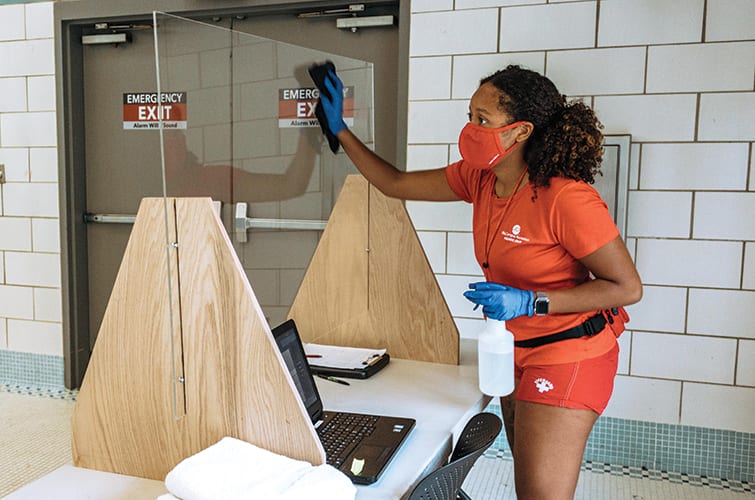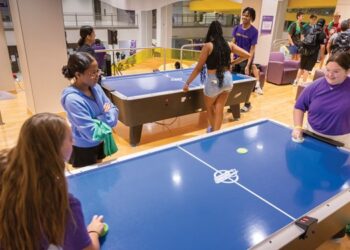Schools from across the U.S. share about the COVID-19 impact on campus recreation and their thoughts on the future of the industry. Below are the professionals who shared information for the COVID-19 recap that follows.
- Robb Bolton, the director of Campus Recreation/Esports at Pepperdine University
- Kim Clark, the director of Campus Recreation at the University of Houston
- Greg Corack, the associate director for Leadership and Programs at East Carolina University (ECU)
- Amanda Deml, the director of University Recreation (UREC) at Seattle University
- Kirk Fallon, the director of Student Recreation at Red Rocks Community College (RRCC)
- Olivia Greer, the fitness coordinator of Group Exercise and Instructional Programs at American University
- Dana Lopez, the associate director of Facilities and Operations at ECU
- Chris Morris, the director of Campus Recreation at Florida State University (FSU)
- Chris Nasti, the assistant director of Fitness and Wellness Programs at American University
- Steven Trotter, the associate director of Wellness and Fitness at ECU
- Mike Warren, the director of Recreation & Wellness at Purdue University
- Mike Widen, the director of Recreational Sports at the University of Michigan
Unique Programs
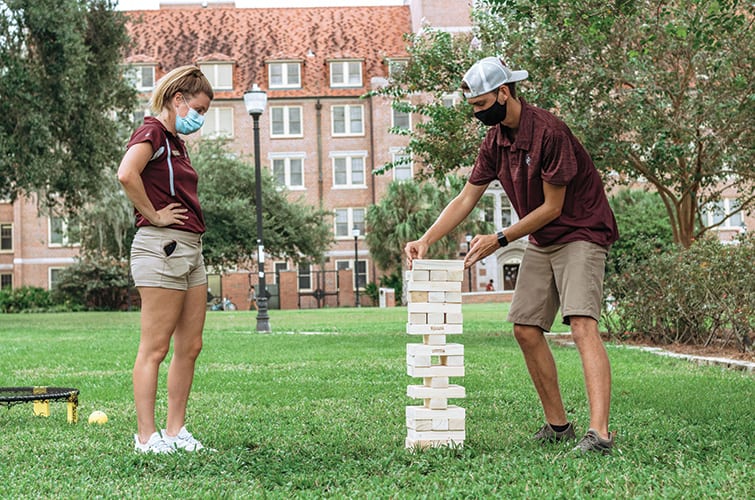
Seattle University
The COVID-19 impact at Seattle University led to the decision to not reopen for the fall semester, focusing on its virtual programming. Two of these include:
- Campfire Community Storytelling series. A monthly program where students gather via Zoom and share stories. For the first month, the theme was local lore and legends of the Seattle area.
- Exercise Your Right to Vote campaign. UREC provides information to students via social media on how to register to vote, when and where to vote, and the importance of their voice.
Red Rocks Community College
- Nutrition. The programming that has gained the most traction over the past few months has been online nutrition education pieces, offering recipes, tips, cooking videos and live cooking demos.
Purdue University
- Cooking demonstrations. The demos looked to help students with cooking at home.
- One-on-one financial wellness coaching. Lessons learned included managing money and making informed financial decisions.
- Virtual escape room. The one-hour adventure where a group unlocks clues.
East Carolina University
- NFL Pick ‘Em. A weekly online challenge through IMLeagues with prize winners each week.
- Meet Them Where They Are campaign. The weekly program includes Munchie Monday, Therapeutic Thursday and Fresh Food Friday. Each week, the programs are offered on various parts of campus and allow for 30 to 90 seconds of engagement for students and faculty/staff.
Fitness and COVID-19 Impact
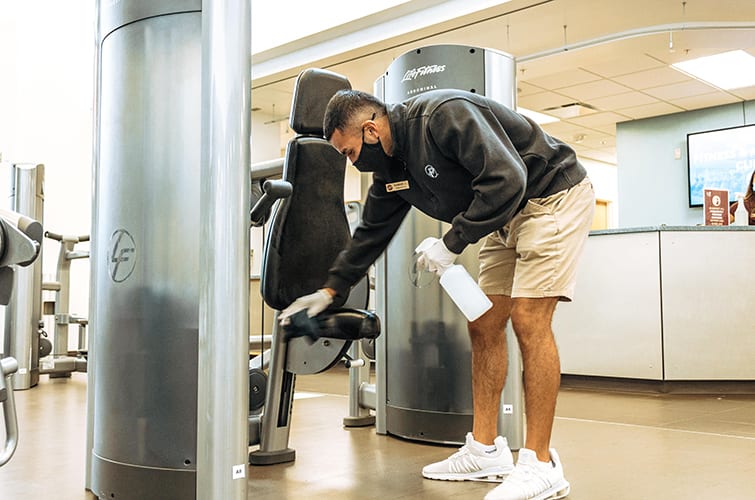
Seattle University
Live group fitness classes, fitness webinars like “Tips for Exercising at Home” led by a personal trainer, and 30-minute motivational check-ins with a trainer have transitioned in-person fitness programs to virtual.
Purdue University
More Group X virtual classes will be launched at the end of November when the campus goes back to online-only until the new semester.
Virtual one-on-on sessions like wellness coaching, nutrition consultation and athletic training appointments have served students’ various needs.
American University
Group X Plus: In collaboration with Georgetown University and IMLeagues, this program provides both communities with access to an expanded virtual group exercise schedule of over 30 classes per week.
Red Rocks Community College
The Build Me A Workout program allows personal trainers to build a customized workout plan based on what the student has at their disposal — bag of flour, staircase, etc.
Operations and Guidelines
Seattle University may not have reopened its fitness center, but the community can still take part in UREC’s equipment rental program, and outdoor open recreation at the Seattle University Park and the tennis courts.
The University of Michigan moved to cashless operations and opened one of its gymnasiums to serve as a distribution location for the campus dining program. “We have some of the largest open space on campus, so we were able to partner to help in their de-densification efforts,” said Widen.
The University of Houston added automatic faucets and paper towel dispensers in areas that didn’t previously have them. “We even added toe hooks on the bottom of doors to allow participants to open a door with their foot,” said Clark.
At Purdue, students are communicated with via the FusionGo app. It allows Recreation & Wellness to send push notifications with guideline changes and to use contactless barcode scans to check in.
While the flow of entering and exiting entailed a lot of new signage, marketing and behavior change, Warren said the new COVID-19 mask rule is changing member preference. “Our cardio equipment is being used less and our strength equipment is being used more,” he said. “We are starting to remove some of our cardio options and add more strength.”
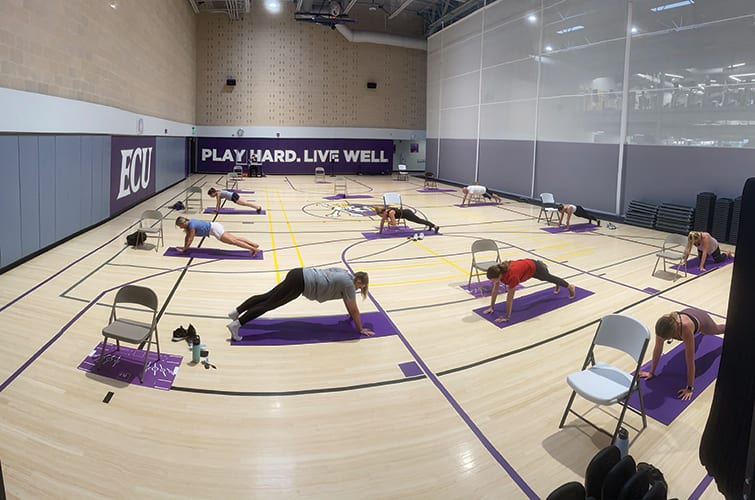
At ECU, traffic flow patterns are coupled with the school’s mascot, the Pirates. Arrows are designed to look like planks from a ship and social distancing graphics were designed with an “X marks the spot” theme like a treasure hunt.
A stop-and-go system for cardio is also implemented at ECU. “When a member arrives at the cardio deck, they are greeted by a team member who welcomes them and provides a brief overview of the new procedures,” said Trotter. “The member will be directed to any equipment that has a green placard on it, indicating it is sanitized and available for use. The green placard is then removed and after the exercise session is complete, a red placard will be placed on it indicating a team member needs to sanitize it and prepare it for use again.”
COVID-19 Impact on Personal Training
Personal training has gone online as well. At Pepperdine University, it’s been one of the most impactful offerings, made possible via the app TrueCoach. “This was also very critical in keeping staff employed who had worked in group fitness and other related areas that had been shut down,” said Bolton.
Morris echoed Bolton, saying virtual personal training really took off. “Many students who may have been intimidated by utilizing our recreation centers previously because of various barriers — be it body image, not knowing where to start, or convenience factors such as parking and crowded peak times — are now engaged as those barriers are removed in the virtual landscape,” he said.
Outdoor Recreation
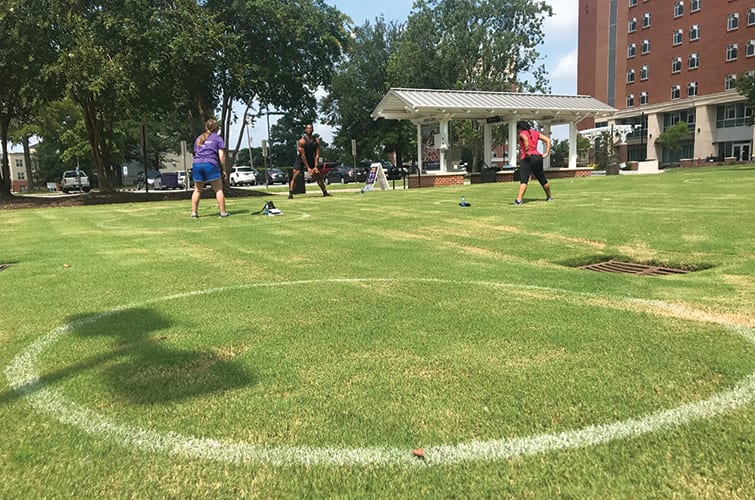
Florida State University
Outdoor coordinators Sean Bricker and Sean Wilkinson launched “Sean & Sean Explore the Great Outdoors,” a live, weekly program coupling outdoor education with a weekly social media challenge. That evolved into another video series, “Sean & Sean Explore Local,” which took students to little-known experiences in the area.
Additionally offered are campus-based excursions such as urban hikes, bike rides and local half-day trip experiences. Participants meet trained outdoors staff at the trip’s starting point to embark on a socially-distanced and masked adventure.
Red Rocks Community College
The DIY Adventure Trip program allows students to request a custom-built package that offers outdoor equipment, video tutorials, and tips and recommendations based on the areas they want to explore.
Staff Management
Student employee training went online at the University of Houston. Clark said they adopted a blended learning training model by using Articulate in response to the COVID-19 impact on the school. The “Return to Rec” training module featured 11 lessons focusing on general COVID-19 information as well as changes in daily duties, operations, programmatic/activities and the emergency action plan.
Communication is critical internally. Purdue used Basecamp initially to communicate with its staff, later settling into Microsoft Teams.
To determine staffing needs at ECU, leadership went through identifying the service journey and stating what they wanted students and members to experience before they walked in the doors, during their time there and after they left. This resulted in dedicated team members in varying areas of the facility including entry points, check-in stations and the fitness floor to make sure all student needs are met and guidelines are followed.
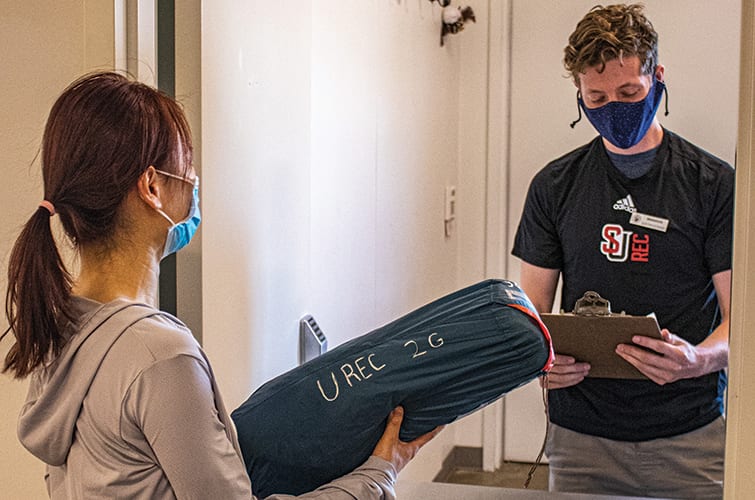
Team culture was put at the forefront for FSU when collaborating virtually. “Effective communication when in a virtual workplace is especially important, as it is very challenging to be able to get a sense of overall team morale without face-to-face conversations and casual encounters. Numerous types of intentionally scheduled engagement opportunities are vital — team meetings, coffee hours, one-on-one meetings, portfolio discussions, etc,” said Chris Morris.
At RRCC, Fallon elaborated your best effort can look drastically different each day when working from home. “2020 has forever changed our perception of what productivity looks like,” he said. “The results aren’t as tangible. Some days we can crush it and cross all eight things off the to-do list, and other days we’re lucky if we answer a few emails and put on a decent shirt for the Zoom call. But it’s OK. Learning to give yourself and your coworkers some grace in these weird times can go a long way.”
Future Outlook on COVID-19 Impact
- “I believe many of the ways we look at managing fitness centers will change moving forward and focus more on catering to the needs of the community we serve while being more focused on the well-being versus the vanity focus of exercise.” — Robb Bolton
- “Demands to continue offering hybrid programs with a combination of both in-person and virtual programs will become more mainstream with students wanting to access programs and services at their convenience, essentially 24 hours a day.” — Kim Clark
- “On top of the loss of student fees, capacity constraints have negatively impacted our ability to generate revenue on memberships, reservations and programs. We face major financial challenges now and in the short term moving forward with the loss of funding. However, what we do as recreation and wellness professionals is critical to the success of our students. We are essential. We need to remind our administration of that fact with data.” — Mike Warren
- “We will see the rise of personal movement spaces in our recreational facilities and residential spaces. Over the last year, I’ve witnessed many students and faculty/staff come into our facilities and go into a studio finding themselves a small area with some hand weights, a mat, a band and their iPad. They created their own movement experience. We should start building these in our spaces; if you don’t at least offer it they will find someone who will.” — Steven Trotter
- “The pandemic has put a microscope on all of our relationships, personal and professional. Do you trust your team completing their job duties? Does your team communicate effectively? And when you do communicate, are you being transparent in how everything is going? All of those factors play a crucial role in the success of your department. It’s one thing to communicate, but it’s another thing to communicate honestly.” — Kirk Fallon
- “The future of our collegiate recreation community rests on diverse and intentional programs, both virtual and in-person. Our team has learned that virtual experiences are just as valuable as in-person ones.” — Chris Morris
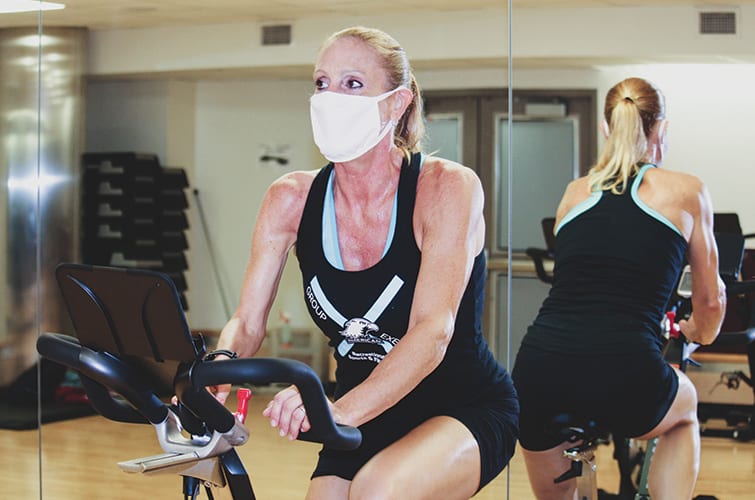
For more COVID-19 impact news and happenings, visit Campus Rec’s COVID-19 Resource Page.



